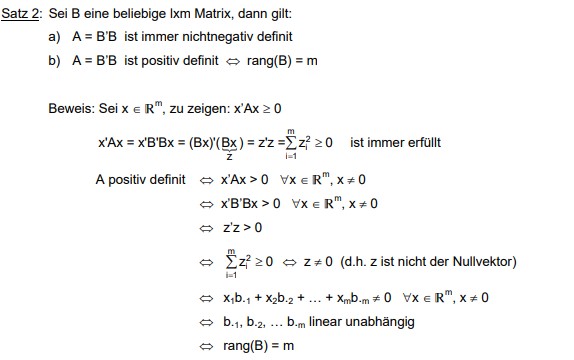
Text erkannt:
Satz 2: Sei B eine beliebige Ixm Matrix, dann gilt:
a) \( A=B \) ' \( B \) ist immer nichtnegativ definit
b) \( A=B^{\prime} B \) ist positiv definit \( \Leftrightarrow \operatorname{rang}(B)=m \)
Beweis: Sei \( x \in \mathbb{R}^{m} \), zu zeigen: \( x^{\prime} A x \geq 0 \)
\( x^{\prime} A x=x^{\prime} B^{\prime} B x=(B x)^{\prime}(\underbrace{B x}_{z})=z^{\prime} z=\sum \limits_{i=1}^{m} z_{i}^{2} \geq 0 \) ist immer erfüllt
A positiv definit \( \Leftrightarrow x^{\prime} A x>0 \quad \forall x \in \mathbb{R}^{m}, x \neq 0 \)
\( \begin{array}{l} \Leftrightarrow x^{\prime} B^{\prime} B x>0 \quad \forall x \in \mathbb{R}^{m}, x \neq 0 \\ \Leftrightarrow z^{\prime} z>0 \\ \Leftrightarrow \sum \limits_{i=1}^{m} z_{i}^{2} \geq 0 \Leftrightarrow z \neq 0 \quad \text { (d.h. } z \text { ist nicht der Nullvektor) } \\ \Leftrightarrow x_{1} b_{\cdot 1}+x_{2} b_{\cdot 2}+\ldots+x_{m} b_{\cdot m} \neq 0 \quad \forall x \in \mathbb{R}^{m}, x \neq 0 \\ \Leftrightarrow b_{\cdot 1}, b_{\cdot 2}, \ldots b_{\cdot m} \text { linear unabhängig } \\ \Leftrightarrow \operatorname{rang}(B)=m \end{array} \)
Sei A eine mxm Matrix. Ich werde das Gefühl nicht los, dass etwas in diesen Beweis inkorrekt ist .Also zu a) ,beim Beweis müsste die Summe nicht bis "l" gehen, da "z" ja ein lx1 Vektor ist? Zu b) bei der Summe müsste ja ">0" stehen (positiv definit) und eben wieder bis "l" oder?